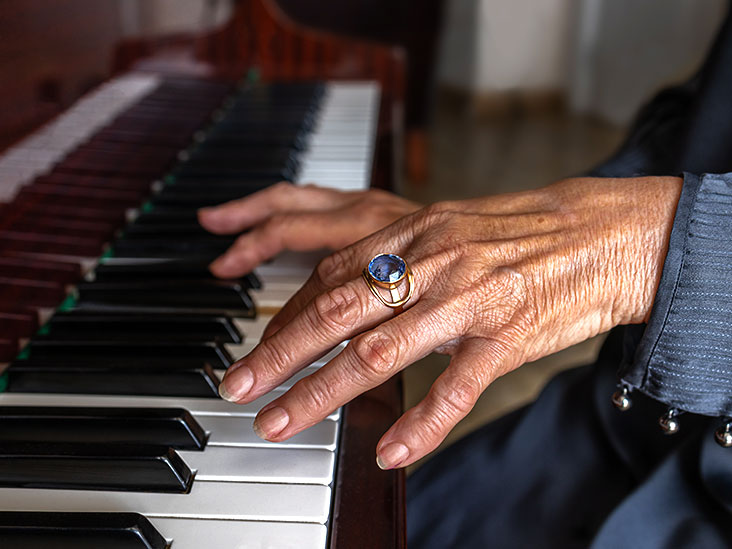
- Age-related cognitive decline can be a risk factor for dementia but is currently underdiagnosed.
- A new pilot study shows that simple musical tests combined with EEG recordings could help to predict cognitive decline in older adults.
- In the future, musical tests could be used to more accurately detect cognitive decline and enable earlier intervention.
Cognitive decline describes the changes in cognitive abilities such as memory, awareness, and judgment that may occur with aging. In the United States, over
As well as being an impairment to mental function in older age, mild cognitive impairment can also be a risk factor for Alzheimer’s disease and other forms of dementia. However, age-related cognitive decline does not always worsen or lead to Alzheimer’s or dementia.
Still,
In an effort to find a more effective method of detecting cognitive decline as a risk factor for dementia, a recent study used a combination of musical tests and electroencephalogram (EEG) recordings to identify cognitive decline in seniors.
The research was led by EEG company Neurosteer and Tel Aviv University in Israel and is published in the journal Frontiers in Aging Neuroscience.
The present study included 50 patients from the inpatient rehabilitation department of Dorot-Netanya Geriatric Medical Center in Israel, ages 77 years on average, as well as 22 healthy controls.
To assess participants’ cognitive status, each participant completed the Mini-Mental State Examination (MMSE), the current gold standard method for evaluating cognitive function. This manual assessment is usually conducted by a trained occupational therapist and includes a variety of tasks designed to test cognitive ability.
Next, participants were asked to complete a simple musical test.
Participants were played short melodies and asked to press a button when the melody played. Over time, the task increased in difficulty, with participants being asked to press a button when only one type of instrument was playing.
At the same time as completing the test, participants were wearing an electrode strip on their forehead to measure the electrical activity in their brain, known as an EEG. The researchers wanted to see whether brain activity recorded by the EEG could match participants to their previously measured cognitive status.
Using machine learning, the researchers were able to detect patterns in the EEG recordings that correlated to the clinically validated measures of cognitive status recorded earlier.
They found that both participants’ reaction times and EEG recordings were significantly correlated to these measures.
The EEG recordings could not only separate the younger participants (healthy controls) from senior participants but could also separate senior participants with differing levels of cognitive ability.
The findings suggest that this technique is sensitive to even subtle changes in cognitive ability, and could be a useful way to detect cognitive decline before it is measurable using current methods.
“Our method enables the monitoring of cognitive capability and detection of cognitive decline already in the early stages by simple and accessible means, with a quick and easy test that can be conducted in any clinic,” the researchers said in a press release.
Currently, the MMSE test is usually performed only after symptoms have been observed and, as a subjective assessment, individual variables, such as age and educational level, may also affect scores.
The researchers’ approach to testing cognitive function with music — which uses a new and more portable form of EEG requiring only three electrodes — has several practical benefits, including being noninvasive, low cost, and requiring only a short setup and testing time (15 minutes). The device can be used by any staff member, the researchers say, without special training.
The researchers note that the test can even be enjoyable from the patient’s perspective.
“All those who underwent the experiment reported that, on the one hand, it challenged the brain, but on the other it was very pleasant to perform,” said lead author Neta Maimon, a PhD student at the School of Psychological Sciences at Tel Aviv University, in a press release.
According to researchers, musical tests like this stimulate multiple centers of the brain, while also being pleasant to perform and potentially mood boosting.
The hope for this form of testing is that it could help to predict cognitive decline at the early onset, enabling earlier and more effective treatment and preventing severe dementia.
“Prophylactic tests of this kind are commonly accepted for a variety of physiological problems such as diabetes, high blood pressure or breast cancer; however, to date no method has yet been developed to enable routine, accessible monitoring of the brain for cognitive issues,” the researchers wrote.
Although the results seem promising, it is important to note that this pilot study involves a relatively small number of participants.
The authors say future studies should include a longer testing period, a larger patient cohort, and performing tests over time to assess cognitive state throughout the aging process.
This is in line with feedback MNT received from Dr. Giovanni Di Liberto, whose research focuses on auditory-cognitive neuroscience, using methods including EEG:
“The search for objective metrics of this kind is important and is something I am working toward in my own research,” Dr. Di Liberto said.
“However, it is important to note that the findings in this study are preliminary. The authors themselves refer to their study as a ‘pilot’ investigation.”






